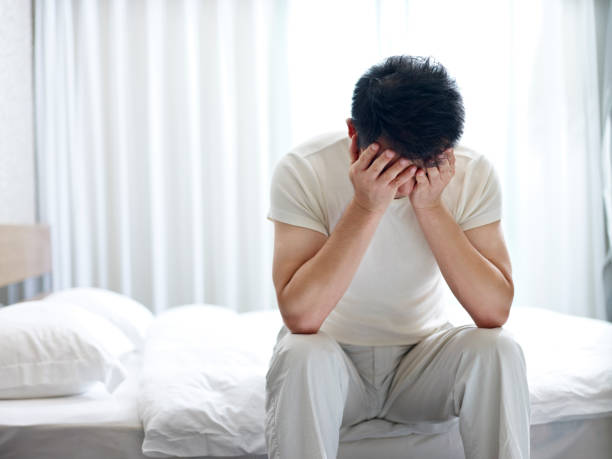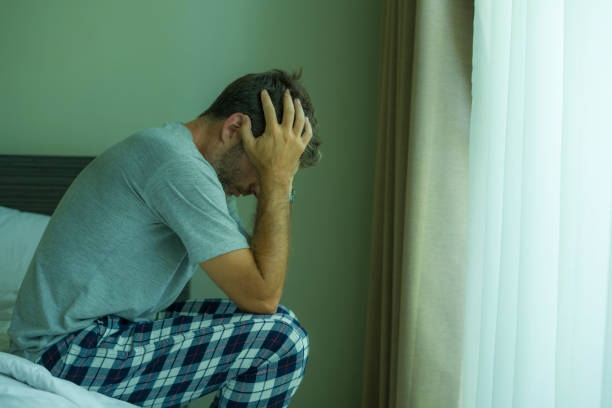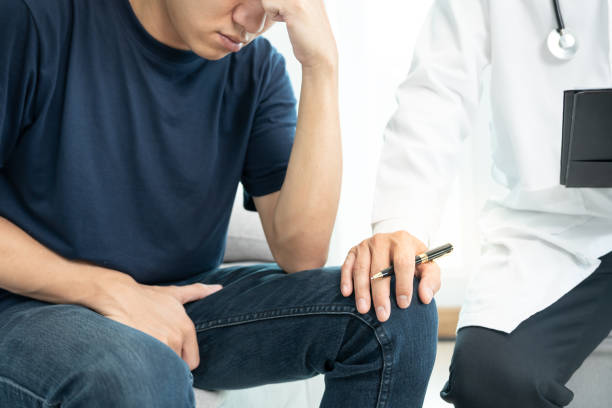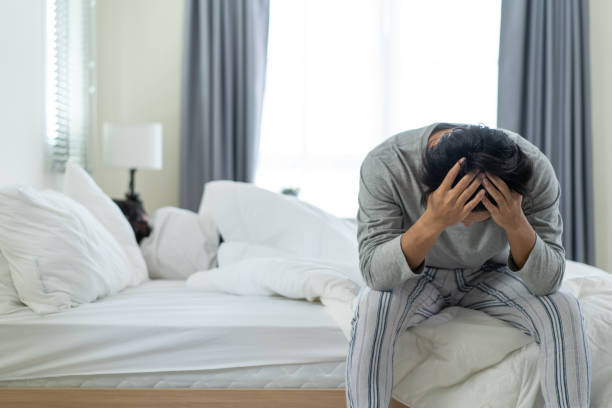Erectile dysfunction (ED) is more common than many men realize. It doesn’t just happen to older men—stress, lifestyle, and mental health can affect younger men too. While physical health plays a role, your mind has just as much power over your sexual performance. It is one of the biggest triggers for ED, yet it’s often overlooked because many people focus only on medical causes. When your body is under constant pressure, stress hormones rise, blood flow decreases, and sexual desire can drop. This creates a chain reaction that makes it harder to perform in the bedroom. If you’ve ever wondered, can stress cause ED?—the answer is yes.
The good news is that stress-related ED is often temporary and reversible with the right steps. By lowering it and building healthier habits, most men see major improvements. In this article, we’ll break down how it affects erections, the warning signs to watch for, and proven ways to manage it so you can improve both your mental and sexual health.
What Is Erectile Dysfunction?
Erectile dysfunction (ED) happens when a man has trouble getting or keeping an erection firm enough for sex. For some, it may occur only once in a while, while for others it can become a regular problem. It’s not just a physical issue—it can also be tied to emotions, hormones, or even daily habits like smoking, drinking, or lack of sleep. This means ED often has more than one cause, and it is often at the center of it.
According to the Cleveland Clinic, ED affects about one in three men at some point in their lives, making it one of the most common sexual health concerns. While age and medical conditions like diabetes, high blood pressure, or heart disease can raise the risk, it is a leading cause that many men underestimate. Emotional stress, financial worries, or relationship tension can all trigger ED, even in men who are otherwise healthy. Understanding this connection is the first step toward finding the right solution.

Can Stress Really Cause ED?
Yes—stress can directly cause ED. When you feel stressed, your body reacts in ways that make it harder to perform sexually. Here’s how it happens:
- Hormone imbalance: It raises cortisol, the “stress hormone,” which lowers testosterone levels. Low testosterone can weaken libido, reduce energy, and make it harder to keep strong erections.
- Nervous system impact: It keeps your body in “fight or flight” mode, a survival response meant for danger, not intimacy. In this state, blood is directed to vital organs like the heart and muscles instead of the penis, making erections more difficult.
- Mental distraction: It also affects your thoughts. When your mind is racing with worry—whether about work, money, or relationships—it’s tough to relax and enjoy intimacy. This often leads to performance anxiety, where fear of failure creates even more ED problems.
A study published in the Journal of Sexual Medicine shows that psychological stress is strongly linked to erectile difficulties across different age groups. This proves that ED isn’t only about physical health. The body and mind are deeply connected—when one is out of balance, the other feels it too. That’s why addressing its is just as important as treating physical causes of ED. are deeply connected—when one is out of balance, the other feels it too.
Signs Stress May Be Behind Your ED
Not all ED is caused by stress, but there are clear signs that its may be the main trigger. Recognizing these clues can help you figure out if your problem is more mental than physical:
- Your erections are fine during sleep or masturbation, but not during sex. This shows your body is capable of normal erections, but stress or performance anxiety is blocking the process during intimacy.
- ED happens during times of heavy workload, financial worries, or relationship issues. If your erections come and go depending on what’s happening in your life, its is likely playing a big role.
- You feel anxious, tense, or guilty about sexual performance. Negative thoughts and self-doubt can interrupt arousal, making it harder to stay focused during sex.
- Symptoms improve when you relax, exercise, or take a break from stress. If erections return during vacations, weekends, or after stress relief, it’s another clue that stress—not a medical condition—is the cause.
If you notice these patterns, it could be the main driver of your erectile issues. The good news is that stress-related ED is usually temporary. Once the levels go down and confidence improves, sexual performance often returns to normal.
The Vicious Cycle: Stress and Performance Anxiety
One of the biggest challenges is the cycle stress creates. It doesn’t just affect you once—it can build on itself and make the problem worse over time. Here’s how it usually happens:
- You feel stressed about life. Work, money, family, or personal struggles raise your stress levels.
- Stress makes it harder to get or keep an erection. High cortisol and constant tension interfere with blood flow and sexual desire.
- This leads to embarrassment or worry about your performance. After one or two bad experiences, you may start to fear it will happen again.
- That worry creates even more stress next time. This is called performance anxiety, and it can turn a temporary problem into a long-term struggle.
Breaking this cycle is key to regaining confidence and improving sexual health. The sooner you address it, the easier it is to restore normal erections and enjoy intimacy again. With the right steps, you can stop it from controlling both your mind and your sex life.

How to Manage Stress-Related ED
The good news? Stress-related ED is often temporary. With the right tools, you can reduce it and improve erections naturally.
1. Practice Stress-Relief Techniques
Managing stress daily can improve both mental and physical health. Try these methods:
- Deep breathing or meditation – Helps calm the nervous system.
- Yoga or stretching – Reduces muscle tension and boosts circulation.
- Mindfulness – Keeps you present instead of lost in worry.
2. Stay Physically Active
Exercise is one of the best natural treatments for stress and ED. It lowers cortisol, improves blood flow, and boosts testosterone. Aim for at least 30 minutes of activity most days, such as:
- Walking or jogging
- Weight training
- Cycling
- Swimming
3. Improve Sleep Quality
Poor sleep increases stress and lowers testosterone. Try to get 7–9 hours of quality rest each night. Tips include:
- Keeping a consistent bedtime
- Avoiding screens before sleep
- Limiting caffeine late in the day
4. Eat a Stress-Reducing Diet
Food affects both mood and sexual health. Focus on:
- Leafy greens – Improve blood circulation
- Nuts and seeds – Support testosterone levels
- Whole grains – Steady energy and mood
- Fatty fish – Reduce inflammation and boost heart health
The Harvard School of Public Health notes that balanced nutrition is critical for both mental health and sexual performance.
5. Limit Alcohol and Smoking
Alcohol and smoking not only damage blood vessels but also increase anxiety. Cutting back can reduce ED and improve overall performance.
6. Communicate With Your Partner
Talking openly about ED with your partner can reduce pressure. Honest communication builds trust and makes intimacy more relaxed and enjoyable.
7. Seek Professional Help
If it feels overwhelming, therapy or counseling can help. Cognitive-behavioral therapy (CBT), for example, has been shown to improve both anxiety and sexual function.
Medical Options for Stress-Related ED
Sometimes lifestyle changes aren’t enough. If stress-related ED continues despite healthy habits, medical treatment may help. These options can support your sexual performance while you work on managing it:
- ED medications like sildenafil (Viagra) or tadalafil (Cialis): These drugs increase blood flow to the penis and can make it easier to achieve and maintain an erection. While they don’t treat the root cause of it, they can give men more confidence and reduce performance anxiety in the moment.
- Testosterone replacement therapy (TRT): If tests show your testosterone levels are low, TRT may help restore energy, improve mood, and boost sexual function. Low testosterone and high stress often go hand in hand, so correcting the imbalance can make a big difference.
- Therapy with a sexual health professional: Speaking with a therapist, counselor, or urologist can address both the mental and physical sides of ED. Cognitive-behavioral therapy (CBT), in particular, is effective for men with anxiety or stress-related performance problems.
Always talk to a doctor before starting any treatment. Self-medicating or buying ED pills online can be risky. A healthcare professional can check for underlying conditions and guide you toward safe, effective solutions. You can read more about medical options from the National Institutes of Health.

When to See a Doctor
If ED lasts more than a few weeks or keeps coming back, it’s best to get checked. A doctor can rule out underlying health conditions such as:
- Diabetes
- Heart disease
- High blood pressure
- Hormonal imbalances
Even if stress is the main cause, medical guidance can give you peace of mind and proper treatment options.
Conclusion: Take Back Control of Your Sexual Health
Stress may be part of modern life, but it doesn’t have to control your sex life. By understanding the link between stress and ED, you can take proactive steps to manage both. Simple daily habits—like exercise, better sleep, and stress management—can make a big difference. And if needed, professional support is always available.
Have you noticed stress affecting your performance? What methods help you relax and stay connected?



